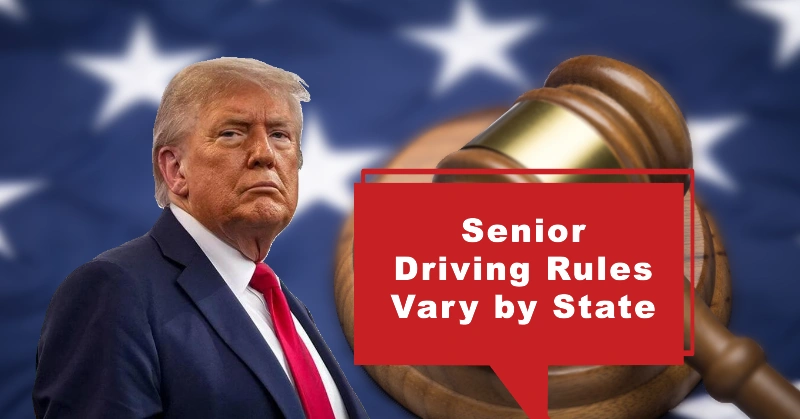A viral claim circulating online warns that starting July 2025, senior drivers across the United States will face mandatory in-person license renewals, vision and cognitive tests, and annual road exams for individuals aged 87 and up. The message attributes this to a new federal law enforced by the U.S. Department of Transportation (USDOT) and coordinated with state Departments of Motor Vehicles (DMVs).
However, a detailed investigation confirms that no such federal rule exists. The claim is false and misrepresents how driver licensing is regulated in the United States.
Table of Contents
Driver Licensing Is a State Responsibility, Not Federal
In the U.S., driver licensing laws are created and enforced by individual states, not by the federal government. While the USDOT oversees commercial transportation safety and national highway infrastructure, it has no authority over private driver licensing requirements.
Each state independently decides renewal procedures, age-related restrictions, and medical review protocols.
Senior Driving Rules Vary by State
Although the federal government does not mandate testing for older drivers, some states do implement stricter rules for seniors. Here’s a brief overview:
| State | Vision Test | Road Test | Online Renewal |
|---|---|---|---|
| California | Required at age 70+ | Only if flagged by DMV | Not available after age 70 |
| Florida | Required at age 80+ | At DMV discretion | Allowed with updated eye exam |
| Illinois | Required at 75+ | Mandatory road test at 87+ | Not allowed for 75+ |
| Texas | Required at each renewal | Optional if medically flagged | Not available after age 79 |
These policies are state-specific and based on local data regarding senior safety, not a federal directive.
Why the Viral Claim Is False
There are no laws, no official DOT announcements, and no regulations filed in the Federal Register supporting the July 2025 federal senior driving rule.
Key inaccuracies in the viral message include:
- Misattributing licensing authority to USDOT
- Claiming a national rollout when none has been initiated
- Presenting fabricated test requirements and enforcement timelines
The claim that state DMVs will jointly enforce a federal mandate is also baseless, as no such coordination has occurred or been announced.
The Real Challenges of Senior Driving
With over 48 million licensed drivers aged 65 and up in the U.S., concerns about road safety among seniors are valid. Age-related changes in vision, reaction time, and cognition can affect driving ability. However, many seniors self-regulate by avoiding driving at night, in heavy traffic, or long distances.
States use individualized assessments when concerns arise, such as:
- A physician reporting cognitive decline
- Family members submitting concerns
- Traffic incidents or medical conditions like seizures or stroke
Tips for Senior Drivers
Instead of reacting to false online rumors, seniors should:
- Check their state DMV website regularly
- Maintain up-to-date vision prescriptions
- Keep track of health conditions and consult with their doctor
- Take defensive driving courses (often offering insurance benefits)
- Securely store and renew licenses within their state’s timeframe
Some states also offer restricted licenses (e.g., daylight-only driving or local area limits) for those with mild impairments.
Minnesota New Major Law Changes Effective July 1, 2025: Driving, Traffic, and Tax Hikes Explained
Final Verdict: No Federal Driving Test Law Exists
The claim of a sweeping federal law targeting senior drivers beginning in July 2025 is completely false. There is no legislation, regulation, or policy from USDOT to support it. All changes to senior driver licensing continue to be managed at the state level.
Seniors and their families should remain informed through official state DMV websites and credible news sources, rather than viral posts and forwarded messages.
